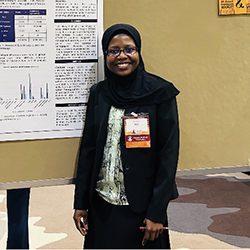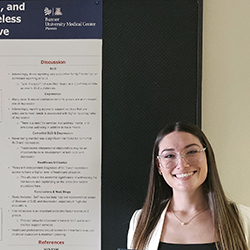Work of Two Medical Students Recognized at ArMA Poster Symposium
Two medical students at the University of Arizona College of Medicine – Phoenix — Fatouma Tall, an MD/MPH candidate, and Danielle Heiser, a fourth-year — were awarded for their brilliance and commitment to tackling pressing issues.
At the Arizona Medical Association’s (ArMA) 2025 Annual Meeting, the organization hosted their Annual Poster Symposium. The symposium welcomes medical students from across the state to submit and present their research abstracts.
Over 80 residents, fellows and medical students submitted abstracts for this year’s ArMA poster symposium. Tall and Heiser were one of the 50 chosen to present their research to a panel of physician judges.

ArMA’s poster authors competed in three categories: clinical research, clinical vignettes and health policy & medical education. Tall and Heiser received 2nd and 3rd place, respectively, in the health policy & medical education category.
Tall studied the effects of social determinants of health and the COVID-19 pandemic on epidural anesthesia during labor deliveries. Her inspiration to study this topic stemmed from her own personal experiences with giving birth to her two children.
Because of the pandemic, hospitals were limited on the number of elective procedures to provide for patient care. Since an epidural is considered an elective procedure, Tall wanted to see if there were disparities during the pandemic.
“It took me two years to go through each data pool and make sure all of the information was correct,” Tall said. “Seeing that there’s no disparities here in Arizona at Banner Hospital made me happy because it made me realize people are getting more educated about pain management when it comes to giving birth.”
Tall examined data exclusively within Banner – University Medical Center Phoenix and looked at factors such as race, ethnicity and language to see if there were disparities in care.
“Seeing that there are no disparities when it comes to epidural usage means that Arizona can take further steps when it comes to other disparities,” Tall said. “Disparities exist in every aspect of health care, so being able to see that there are no demographic disparities when it comes to vaginal deliveries helps a lot.”
For Heiser’s project, she identified risk factors and protective factors associated with diagnoses of substance use disorder and/or depression among young adults experiencing homelessness in the greater Phoenix area.

Heiser looked for social determinants of health, which can stem from adverse childhood experiences to access to transportation or food. Of those experiencing homelessness, Heiser found that the young adult demographic is disproportionately affected by negative health outcomes.
“Those who reported having supportive family and friends were actually at an increased risk of having a substance use disorder,” Heiser said. “On the flip side, those who had never married were more at risk for having both substance use disorder and depression.”
A common protective factor for young adults across the three groups Heiser studied was having access to the internet.
Although this study differs from Heiser’s medical focus, radiology, this passion project allowed her to examine the risk factors regarding substance use disorder and mental illness.
“I thought this project was a good way to delve deeper into some of those issues that are present in our community,” Heiser said. “I’ve been pretty involved with our Street Medicine Phoenix team, and we have had some experience with interacting with this population. This project brought together a lot of these different interests of mine.”
About the College
Founded in 2007, the University of Arizona College of Medicine – Phoenix inspires and trains exemplary physicians, scientists and leaders to advance its core missions in education, research, clinical care and service to communities across Arizona. The college’s strength lies in our collaborations and partnerships with clinical affiliates, community organizations and industry sponsors. With our primary affiliate, Banner Health, we are recognized as the premier academic medical center in Phoenix. As an anchor institution of the Phoenix Bioscience Core, the college is home to signature research programs in neurosciences, cardiopulmonary diseases, immunology, informatics and metabolism. These focus areas uniquely position us to drive biomedical research and bolster economic development in the region.
As an urban institution with strong roots in rural and tribal health, the college has graduated more than 1,000 physicians and matriculates 130 students each year. Greater than 60% of matriculating students are from Arizona and many continue training at our GME sponsored residency programs, ultimately pursuing local academic and community-based opportunities. While our traditional four-year program continues to thrive, we will launch our recently approved accelerated three-year medical student curriculum with exclusive focus on primary care. This program is designed to further enhance workforce retention needs across Arizona.
The college has embarked on our strategic plan for 2025 to 2030. Learn more.